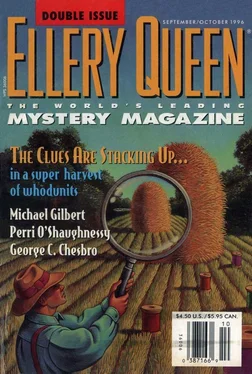Doug Allyn - v108 n03-04_1996-09-10
Здесь есть возможность читать онлайн «Doug Allyn - v108 n03-04_1996-09-10» весь текст электронной книги совершенно бесплатно (целиком полную версию без сокращений). В некоторых случаях можно слушать аудио, скачать через торрент в формате fb2 и присутствует краткое содержание. Город: Dell Magazines, Год выпуска: 1996, Издательство: Dell Magazines, Жанр: Детектив, на английском языке. Описание произведения, (предисловие) а так же отзывы посетителей доступны на портале библиотеки ЛибКат.
- Название:v108 n03-04_1996-09-10
- Автор:
- Издательство:Dell Magazines
- Жанр:
- Год:1996
- Город:Dell Magazines
- ISBN:нет данных
- Рейтинг книги:4 / 5. Голосов: 1
-
Избранное:Добавить в избранное
- Отзывы:
-
Ваша оценка:
- 80
- 1
- 2
- 3
- 4
- 5
v108 n03-04_1996-09-10: краткое содержание, описание и аннотация
Предлагаем к чтению аннотацию, описание, краткое содержание или предисловие (зависит от того, что написал сам автор книги «v108 n03-04_1996-09-10»). Если вы не нашли необходимую информацию о книге — напишите в комментариях, мы постараемся отыскать её.
v108 n03-04_1996-09-10 — читать онлайн бесплатно полную книгу (весь текст) целиком
Ниже представлен текст книги, разбитый по страницам. Система сохранения места последней прочитанной страницы, позволяет с удобством читать онлайн бесплатно книгу «v108 n03-04_1996-09-10», без необходимости каждый раз заново искать на чём Вы остановились. Поставьте закладку, и сможете в любой момент перейти на страницу, на которой закончили чтение.
Интервал:
Закладка:
Time was on her side, but as she had accumulated sufficient years to simulate wisdom, the other wives had gone — to other schools, to retirement, to the grave. And in their place were women not so much younger than she but whom she found very different. They were bright and ambitious for themselves as well as their husbands. If they were intimidated by Hal’s wife, they showed it only in that they approached her with considerable reserve. So ultimately she was deserving of their respect only and not their friendship. It was at about this time that her daughter married.
Sarah and Hal began to travel more, to Mexico and Hawaii and of course to Italy, and the disappointments she had experienced early in their marriage she felt were behind her. If there was less passion, she and Hal were easier with each other now, expecting little and demanding less. The passage of time had weakened his compulsive assertion of his superiority as it had armed her with a dispassionate indifference. It should have been the best of times, but little by little Hal’s health failed.
In late January, shortly after she had seen the Nobile film, a long article on Ula’s rejection of the cubs appeared in the newspaper. She had read it avidly, and went into Denver the following week to see the cubs, taking the route that would later become as much hers as the steps to her own house or the back walk among Hal’s roses.
Only two months old, the cubs looked like the teddy bears of her childhood as they sprawled on the floor of the nursery with their legs splayed on either side, bodies flat on the carpet. They couldn’t walk yet and propelled themselves across the floor on their stomachs with a rowing motion. Their nose and eyes were black buttons. They nursed greedily in the quilted laps of the women who tended them and shrieked and hissed in disappointment when they had sucked the bottles dry. A volunteer stood with the crowd which had assembled outside the glass of the nursery and demanded they lower their voices because “the noise was causing the cubs stress.” And of course to keep moving so that everyone could see.
Sarah disliked the woman controlling the crowd, disliked her assertive, confident manner. She wondered how such a disagreeable personality had come by her position. In moments Sarah had been rushed past the great glass window of the nursery and found herself again in the bright sunshine. Having already endured Hal’s derision at her interest in the cubs, and disappointed that she had seen so little for her six dollars, she decided she would visit the mother of the cubs, although she was on the other side of the zoo. Still, it was a nice day, warm for January, and Hal would not expect her for hours. She walked past enclosures of kangaroo, ostrich, eland, zebra, and warthog, past the main entrance with its business office to an exhibit entitled “Northern Shores,” where she saw Ula for the first time.
The polar bear pit curved beneath an overhanging high concrete bank cleverly sculpted and studded with stones and simulated streaks of clay to look like the bank of a river. Despite the cleverness, even Cherry Creek, the concrete-walled trench which Sarah followed through the heart of Denver, looked less artificial.
Along the foot of the bank was a narrow beach bordered by a stream which traversed the length of the pit, swiftly running down the slope from right to left. Between it and the low fence was the pool, the surface of which was some four feet below the low box hedge and the three horizontal pipes set in cement posts which made up the barrier between prey and predator. The bear was sitting on the base of its spine alone at one end of the pit, sprawled like an old woman with its stubby hind legs spread indecently apart in front of it. The soles of its feet were as black as its nose and eyes.
The bear was sleek, sleeker than Sarah would have imagined. Its coat looked as smooth as that of the seals it was designed to hunt and feast on. It swung its head toward the spectators. The bear tested the air, probing it with an up and down motion of its head, thrusting its muzzle in the direction of the sparse crowd.
She found herself nodding forward as though she too were testing the air. And for one dizzying moment the bear stopped its motion and stared directly at her across the pool. It wasn’t for long, scarcely time for her heart to turn over, but she felt a piercing thrill, part pleasure and part fear. It was a look which belonged in a cold, wild place.
Suddenly the bear rolled forward and moved with surprising speed along the narrow beach the length of the pit and up the slope through an opening in the concrete wall. She heard a thundering, metallic sound.
“Feeding time,” a tall young man told his small son, who was frowning in disappointment.
And that was it. The bear did not reappear. Sarah descended steps which curved down to a glass viewing area beneath the surface of the pool, which looked quite deep, fifteen or twenty feet at least. It was devoid of life. Feeding time, she reminded herself. She now understood why the surface of the water could be so close to the low fence. There was nothing on which the bears could brace themselves to spring upward. Through the clear water she could see a small white towel lying on the bottom of the pool. She waited for several minutes alone at the glass, but no animal of any sort appeared, and she was getting cold. She walked back into the sun and found her way to the business office with a vague idea of complaining about the disagreeable volunteer in the nursery. Instead she picked up a leaflet which told her that for only forty dollars she could become a member of the zoo and a volunteer herself. She could work in the business office, which she now did, two mornings a week.
After her lunch, usually a sandwich she had brought with her, she would stop to see the cubs, then go to the polar-bear pit. There were bears other than Ula: Otto, a male almost half again as large as Ula and father of the cubs, and another female who was a little larger than Ula, but they did not much interest Sarah, even when they dived in the pool and swam on their backs, playing with blocks of ice like otters. It was Ula with her seal-like skin and eyes that seemed to penetrate Sarah’s skull and burn images of a far-off place into her brain, Ula, who had the memory of her species, of icy waters and white storms, though disappointingly Ula had not been born in the frozen North but in the Louisville, Kentucky zoo. Ula, who paced along that narrow beach, rolling with a rippling, pigeon-toed gait, who caused Sarah to imagine the dark blue skies and limitless sweep of the icecap. Ula was usually solitary, aloof from the others and their often boisterous play.
Sarah went to the bear pit even on snowy days that winter and spring, even on days when driving from Boulder was difficult. Even once when the weather was so bad that Hal had asked her not to. The car knew the way.
One day was very like another with Hal now as his condition worsened. She supposed he did the same things when she was gone that he did when she was there: read, go through his papers, and organize his notes on the long paper on Samson Agonistes, which they both doubted he would ever finish now. Sometimes he watched the news at noon.
In the beginning he had asked her about her day at the zoo, what she had done, what animals she had seen, but he quickly recognized that her job was clerical and menial and that her only interest was in the polar bears. It was Hal who had pointed out to her the small article in the paper that fall, the few lines which indicated that the Denver Zoo would be sending Ula to San Diego. Rejected cubs often did not survive, but Ula’s cubs were now almost a year old and evidently deemed out of danger so that the zoo administrators decided they had a surfeit of polar bears. They had agreed to transfer Ula in November.
Читать дальшеИнтервал:
Закладка:
Похожие книги на «v108 n03-04_1996-09-10»
Представляем Вашему вниманию похожие книги на «v108 n03-04_1996-09-10» списком для выбора. Мы отобрали схожую по названию и смыслу литературу в надежде предоставить читателям больше вариантов отыскать новые, интересные, ещё непрочитанные произведения.
Обсуждение, отзывы о книге «v108 n03-04_1996-09-10» и просто собственные мнения читателей. Оставьте ваши комментарии, напишите, что Вы думаете о произведении, его смысле или главных героях. Укажите что конкретно понравилось, а что нет, и почему Вы так считаете.












